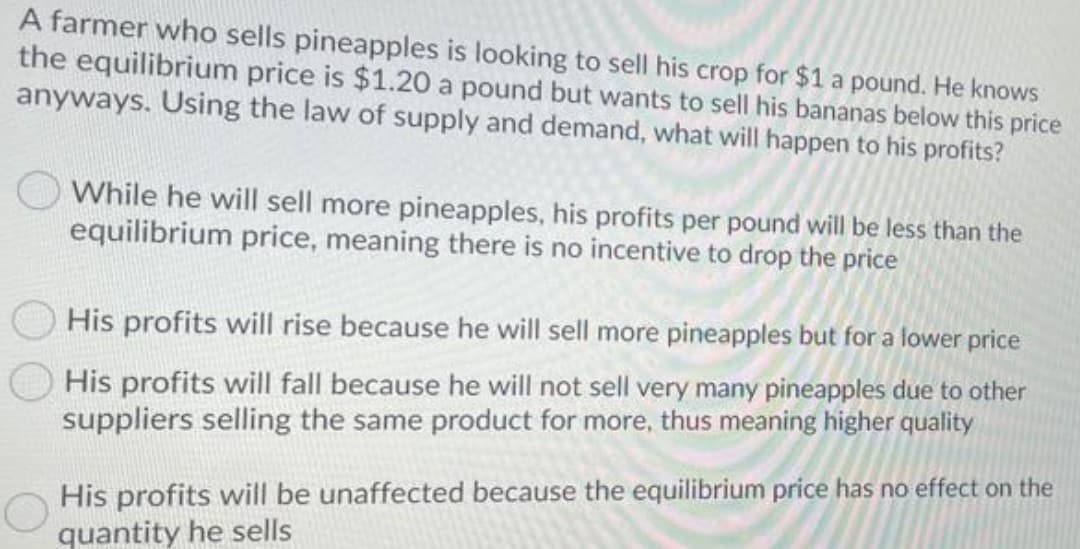A farmer who sells pineapples is looking to sell his crop for $1 a pound. He knows the equilibrium price is $1.20 a pound but wants to sell his bananas below this price anyways. Using the law of supply and demand, what will happen to his profits? While he will sell more pineapples, his profits per pound will be less than the equilibrium price, meaning there is no incentive to drop the price His profits will rise because he will sell more pineapples but for a lower price His profits will fall because he will not sell very many pineapples due to other suppliers selling the same product for more, thus meaning higher quality His profits will be unaffected because the equilibrium price has no effect on the
A farmer who sells pineapples is looking to sell his crop for $1 a pound. He knows the equilibrium price is $1.20 a pound but wants to sell his bananas below this price anyways. Using the law of supply and demand, what will happen to his profits? While he will sell more pineapples, his profits per pound will be less than the equilibrium price, meaning there is no incentive to drop the price His profits will rise because he will sell more pineapples but for a lower price His profits will fall because he will not sell very many pineapples due to other suppliers selling the same product for more, thus meaning higher quality His profits will be unaffected because the equilibrium price has no effect on the
Chapter4: Markets In Action
Section: Chapter Questions
Problem 6SQ
Related questions
Question

Transcribed Image Text:A farmer who sells pineapples is looking to sell his crop for $1 a pound. He knows
the equilibrium price is $1.20 a pound but wants to sell his bananas below this price
anyways. Using the law of supply and demand, what will happen to his profits?
While he will sell more pineapples, his profits per pound will be less than the
equilibrium price, meaning there is no incentive to drop the price
His profits will rise because he will sell more pineapples but for a lower price
His profits will fall because he will not sell very many pineapples due to other
suppliers selling the same product for more, thus meaning higher quality
His profits will be unaffected because the equilibrium price has no effect on the
quantity he sells
Expert Solution
This question has been solved!
Explore an expertly crafted, step-by-step solution for a thorough understanding of key concepts.
Step by step
Solved in 2 steps

Recommended textbooks for you








Microeconomics: Principles & Policy
Economics
ISBN:
9781337794992
Author:
William J. Baumol, Alan S. Blinder, John L. Solow
Publisher:
Cengage Learning

Principles of Microeconomics
Economics
ISBN:
9781305156050
Author:
N. Gregory Mankiw
Publisher:
Cengage Learning